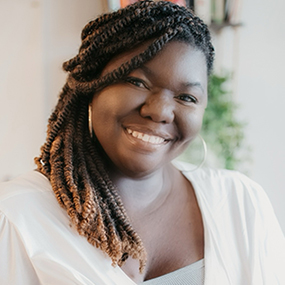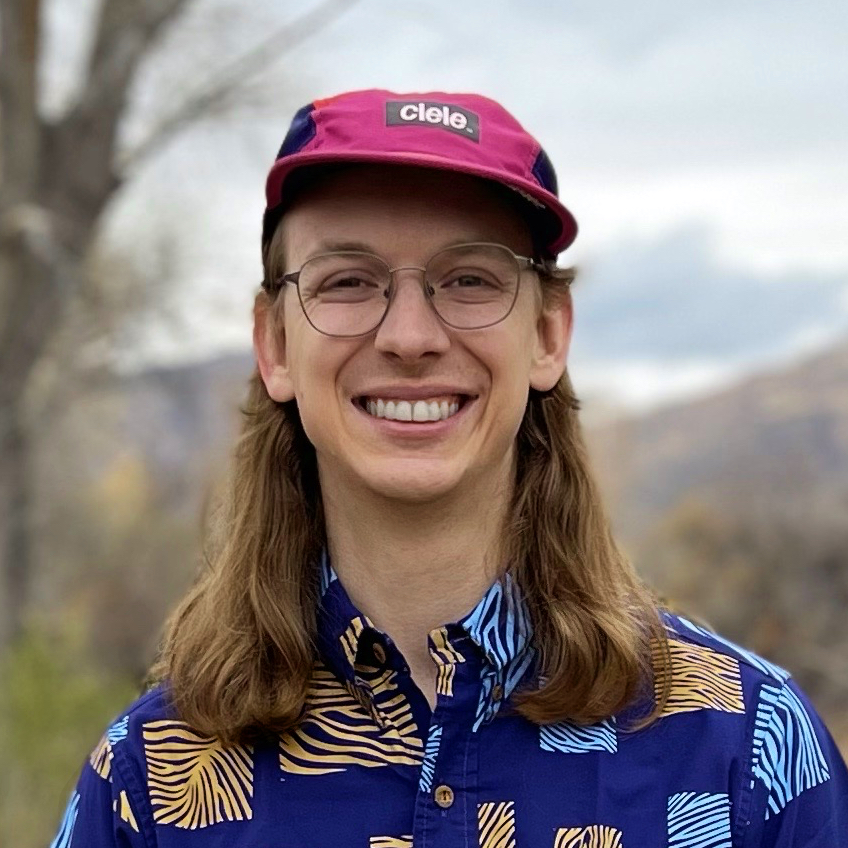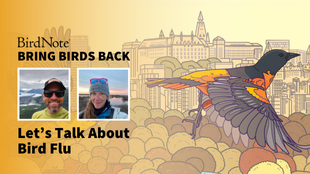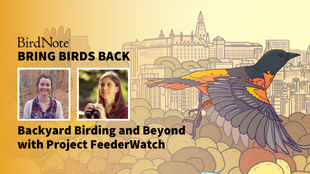

Join BirdNote tomorrow, November 30th!
Illustrator David Sibley and actor H. Jon Benjamin will face off in the bird illustration battle of the century during BirdNote's Year-end Celebration and Auction!
Since her bird journey began, Tenijah’s been learning how to be a better birder —but not just with new birding skills. There’s also the important lesson of how to be an “ethical birder” or treating the birds with respect. Tenijah talks to writer Martha Harbison about “the rules” of birding and how we can be more thoughtful to our feathered friends. But these rules can also be twisted and weaponized against birders from marginalized backgrounds, so she talks to photographer David Lei about how to make sure we’re also being thoughtful to our fellow birders.
Tenijah Hamilton: BirdNote Presents.
[Echoing Wingflaps SFX]
Tenijah Hamilton: One morning in May 2021, staff at the Bolsa Chica Ecological Reserve near Los Angeles came in to find that disaster had struck:
NBC Newscaster: Officials want to remind visitors to follow the rules after a bad experience with a drone. This drone crashed in the area causing thousands of birds called terns to leave their nesting site.
[Moody, somber music with birdsong begins]
NBC Newscaster: They abandoned thousands of eggs that needed to be incubated.
Tenijah Hamilton: This flock of Elegant Terns was in one of just a few places in the country that the birds nest. When these birds face a significant threat at their roosting site, the birds will permanently abandon the area. This loss of thousands of Elegant Tern chicks had a devastating impact on the species, which already has a dwindling population. Drones are banned at the reserve — even if it hadn't crashed, a drone flying near nesting birds looks an awful lot like a predator ready to strike and could scare off the birds — but whoever was flying it either didn't know that or didn't care.
[Pause for somber music solo]
Tenijah Hamilton: This is an extreme example, but for me this highlighted the stakes of not having respect for the birds or nature.
From BirdNote, this is Bring Birds Back. I'm Tenijah Hamilton. This season I'm finding community in birding and learning how to be a better birder. Not just in how to ID the birds — listen to episode 1 for that — but also in how I carry myself when on the trail. I keep hearing about the idea of "ethical birding" and being mindful of our impact on nature. Today we're diving into that: how to be kinder and more thoughtful to our feathered friends.
[Somber music fades out]
Tenijah Hamilton: To start off, I spoke with Martha Harbison. They wear many hats -- they're a birder, writer, the Vice President of Feminist Bird Club -- shoutout to FBC! -- and member of the Galbatrosses, a group highlighting the often overlooked female birds. Hi, Martha. I am so glad to have you here today. How are you?
Martha Harbison: I'm doing great. Thank you for asking and thank you for having me.
Tenijah Hamilton: So I am a relatively new birder. I only started birding, uh, 2020, tail end of 2019. And there's so much to learn, right? And there's so much for new birders to pick up. So I wonder if you can talk to us about what does it mean to be an ethical birder, and why is it important?
Martha Harbison: Yeah, this is a topic that is near and dear to my heart. To me, there's one overarching principle. And that is: we are all in community with nature. One of the ways that we talk about birding a lot, especially with the pandemic and stuff like that, is like: five ways that the outdoors will help you feel better. The way that it gets framed, and I am guilty of this, I have written articles like that, is fundamentally extractive. It's obviously not the same degree as like drilling for oil in the Arctic National Wildlife Refuge, but it is along a continuum of like, what can nature do for me, a person — as if, number one, we're separate from nature. We're not, we are animals that live on planet earth. And I think a lot of the bad behavior of birders comes from that, that mindset of entitlement. What am I owed? What does nature owe me? What do birds owe me? What can they give me?
This is not my original idea at all. I am basically articulating a long tradition of thought about this, particularly from Native American and First Nations communities. We are in community with nature. We exist with them. Once you realize that you're in a community, you make decisions differently. How can I tread with the lightest foot? What can I do that will benefit my community?
[Hopeful music begins]
Tenijah Hamilton: So with Martha's help, we're going to go through some tips on how to be a more ethical and thoughtful birder. It's loosely adapted from the American Birding Association's guidelines for birding ethics, with a few specifics we've heard frequently from conservationists. This isn’t a complete list, nor is everything a hard and fast rule. But these are some of the things you might see when out birding that you might not realize the impact of. And they’re a great place to start.
[Hopeful music fades out]
[As Tenijah says each number in the list (“One” “Two” etc), a musical chord underscores it]
Tenijah Hamilton: Ready? One: Give birds some space.
Martha Harbison: I know how tempting it is, but this can be super harmful, especially to species that aren't used to cities, for example, or just passing through during migration. Really like be mindful of the space that you take up and really reconsider, like, do I really have to go through all these bushes? I can hear the bird. I can recognize that call. I know that it's an Ovenbird that's somewhere out there. You don't have to see the Ovenbird. You can just acknowledge that the Ovenbird is there. When I lead events, that's like, something I talk about. I'm like, let's just sit here and listen to all of these birds that are calling. I know that you probably really want to see them. But I don't want to disrupt them because they've already got enough going on.
Tenijah Hamilton: Two: don't scare the birds out from hiding just to get a better look! This is called “flushing”
Martha Harbison: Basically acting in a way that startles them and causes them to jump from wherever they've been. And I've seen people do that. And it's really distressing. There are birders that do this too, because there are species out there, you can really only hear them. They love to skulk. They'll hide marshes or the underbrush. And some birders think, like, it only counts if I see it. So they'll just like run through an area until they like scare up all the birds. And they're like, “yeah, I saw my Black Rail!”
Tenijah Hamilton: This was actually enough of an issue that the American Birding Association, which officiates birding records and rules, eventually had to adjust what counted for putting a bird on your "life list" to include heard-only records.
Martha Harbison: They changed the rules because people were going out there and flushing a lot of nocturnal species that were sensitive to disturbance and were in declining populations. So how can we make sure that what we're asking people to do is also protecting the birds as much as possible.
Tenijah Hamilton: Three: don't bait the birds. And don’t worry, we’re not talking about sunflower seeds in your feeder for your backyard songbirds. This is about putting out meat to attract raptors.
Martha Harbison: That's a problem again with owls a lot is that people will buy mice from pet stores and then put them down on the ground and the owls will swoop down and take them away. And there are a lot of very specific health concerns because pet store mice can carry things like salmonella. So it's not just changing the birds’ behavior and bringing them towards like, say a road where they could get hurt. But you're also introducing pathogens into the population.
Tenijah Hamilton: Four: nocturnal species like the dark, even if it's harder for you to see — so, don't go shining a spotlight on them.
Martha Harbison: If you shine a spotlight on them, it disrupts their vision! And so if they're night hunting birds and they can't see, then you've just taken away their opportunity to get dinner before their eyes recalibrate. Along that lines, flash photography: also bad for nocturnal species.
Tenijah Hamilton: Five: stay on the trail!
Martha Harbison: Depending on what type of habitat you're in, there are a lot of ground nesting birds. So there's a lot of birds that are like, you know, hanging out on the ground. And if you're not careful, all of that can be disrupted as well.
Tenijah Hamilton: Six: if your pup is joining you, keep it on a leash.
Martha Harbison: Dogs are predators. Birds are going to perceive them as predators. Where I personally see a lot of these issues is on beaches, because people are just like, well, it's like, you know, there's five miles of beach but then there's also like a Least Tern colony and there's symbolic fencing around so that people don't walk on the tern nests or the Black Skimmer nests. But dogs can also disrupt that nesting behavior. And if it gets disrupted enough, they can abandon the nests. And we're already seeing, like, huge population declines in a lot of these beach nesting birds. And so even if like the one time your dog runs through there is not the time that causes the colony to be abandoned, it's never just you. It's never just your one dog or your two dogs. It's like a thousand dogs. Without getting even the issues of dog waste and does that introduce pathogens into the environment... Just be mindful that you are in community with all of nature and all of those small things add up to what can be a very devastating outcome.
Tenijah Hamilton: So one through 6 on this list are things that are pretty universally agreed on. These next few are less of rules and more of guidelines — and some birders disagree about where exactly to draw that line. But here at Bring Birds Back, we're gonna say: err on the side of caution.
Seven: avoid or minimize using playback.
Martha Harbison: Playback is where you take a recording of a birds call or song, and you play it pretty loudly and usually a number of times in order to elicit a response from a bird, whether it's to bring the bird out from heavy vegetation so that you can see it, or you just want to hear it, like, yell back at you.
Sometimes people use predator calls because then they'll come out and be like, I got to check to see if there's a predator here. So that again is like, you know, eliciting a stress response — so that you, human, can benefit from seeing the bird.
I know a lot of people who use it, a lot of bird guides use it. And there's very strong opinions on both sides of this issue.
And I want to be very clear here. Playback is used a lot in marsh bird surveys, for scientific purposes. So it's not like it's directly harming the bird if it hears playback, because a lot of times that's the only way you can count the American Bitterns in your marsh is like you play it’s call and five of them yell back. And you're like, “thank you bitterns! Have a great day.”
But I personally do not use playback, because it's goading the bird to behave in a way that it's not the way that they're behaving right now. It's like poking them.
Tenijah Hamilton: And, along those same lines, eight: go easy on pishing.
Martha Harbison: Pishing is where you go, psh psh psh psh psh. And again, that's to mimic an alarm call of certain birds. It's like saying there is a predator here which causes birds to pop up and look around and see whether there's a predator.
Tenijah Hamilton: Nine: don't put a rare bird on blast. So, the popular birding app eBird has a feature called "Rare Bird Alerts" that lets birders know about an unusual bird seen in their area. And for birds that have dwindling numbers or are easily disturbed by people, like owls and declining raptors, we need to be thoughtful about sending a bunch of birders their way.
Martha Harbison: When the alert goes out, a lot of people all will converge on the spot where the bird was spotted and then do a stakeout.
Tenijah Hamilton: To protect a bird from getting mobbed eBird reviewers can choose to hide a sighting in eBird. But sometimes, birders will still share the location through private text message groups.
Which creates a conundrum: Widely sharing the location of a rare bird can lead to people stressing the bird out. On the other hand, keeping that information only within established groups can also keep new birders out.
Martha Harbison: If I want to see an owl, I know exactly where to drive to andI have a high probability of finding that species. New birders aren't going to know that. And so because of the unethical behaviors of some people, it ends up reinforcing gatekeeping behavior. So I struggle with this a lot.
Tenijah Hamilton: And just to be clear, there are Rare Bird Alerts for relatively common birds seen outside their normal range — like, some New York City birders were recently hyped to see a Red-headed Woodpecker, which is a gorgeous bird. But in Atlanta, that’s a bird I see around town. Those birds are doing fine — get hype, turn your twitter into a Red-headed Woodpecker fan account, you’re all good.
And finally, ten: keep a respectful volume.
Martha Harbison: It’s best to keep in mind, like, okay, what are my goals? If my goals are to see birds and birds get disrupted by sound, then it makes sense for us to be a little bit more quiet. When you're out, like, I don't know, with your friends or listening to music or whatever. The person who's going to suffer the most is you because the birds are going to be like, I want nothing to do with this or you're like terrible taste in music. Or your loud voices.
But I've seen that get weaponized against people. Especially against, you know, marginalized genders and people of color.
Tenijah Hamilton: And Martha has seen other rules get weaponized against certain marginalized groups of people. One experience that stuck with them was when birding with a few friends in Bryant Park. They were all watching an American Woodcock and an older man yelled at the group for being too close to the bird.
Martha Harbison: And we were like 40 or 50 feet away. but he was essentially treating us and very particularly, the Black person that was in this group, he was really targeting him and was really talking down to him and again, we were farther away from that bird than he was.
Tenijah Hamilton: For Martha, being thoughtful of the birds is only half of truly ethical birding.
Martha Harbison: It really is twofold. One is you should treat the birds and the habitats that they use with respect, and you should also treat your fellow birders with respect. How am I going to show up in this space in a way that really makes it positive, not just for me, but for everybody around me and for all the natural areas in which I visit?
Tenijah Hamilton: After the break, we're going to dive a little deeper into how we can be kinder and more thoughtful to our fellow birders. Stick around now.
[MIDROLL AD BREAK]
Tenijah Hamilton: This is Bring Birds Back, I'm Tenijah Hamilton. We're talking to David Lei, a birder and photographer based in New York City. He specializes in wildlife photography and sees birding ethics as really important — but he's also seen these ethics weaponized against him and other birders from marginalized backgrounds.
David Lei: Yeah I think these rules can be used in an exclusionary way, which is unfortunate. That's not the intention, of course, right? I think it runs contrary to the whole idea of ethical birdwatching, which again, I see as ethical treatment, not only of the subjects, but also of fellow birdwatchers. There is, I think sometimes an undercurrent, rather than overt, because that's kind of how things have evolved in our society. There's less overt hostility, shall we call it or overt discrimination.
Tenijah Hamilton: Yup! Name it. Name it what it is.
David Lei: Something that I'm very sensitive to is: there's a group of birdwatchers in my area, allegedly Asian men, who have allegedly intentionally flushed snowy owls for flight shots. I've never seen it myself so that's why I put those caveats there. It's all hearsay, as far as I'm concerned, until I have seen it. But I often have people ask me about the Asian men who flushed the snowy owls. And me being an Asian man, I kind of wonder why is it relevant that they're Asian men. Why mention that to me specifically? Um, I've had somebody ask me if I was part of that group, when I have— for better or worse, I think I'm a reasonably well-known birder in New York. And I don't have a reputation for flushing owls for flight shots at all. In fact I hardly ever post flight shots of owls. But somebody asked me that and that doesn't feel very good. And I think for reasons that folks can probably understand, I shouldn't have to feel, nor should anybody have to feel like they need to be a representative for their race or gender. And again, I think it speaks to that undercurrent, right, of exclusion or unwillingness to develop an understanding with other people. Somebody hears that this is happening from somebody else. Then they amplify it on social media. They themselves have never seen it happen, but it becomes a narrative. That people of a certain background group are engaging in unethical activities.
Tenijah Hamilton: Recently, David shared a photograph of a Snowy Owl on Twitter. And he actually noted in his post how he’d used a long-exposure to get such a good photo.
David Lei: I wanted other photographers who might be interested in trying to replicate my results, I wanted them to know my technique, you know, that it was possible to get that type of picture without using a flash, without disturbing the subject.
Someone I didn't previously know who is also prominent in the New York birding community. He evidently didn't believe me, because he copied the photo without my permission and re-posted it, basically implying that I had indeed taken this photo with a flash.
And I think it's perfectly okay to engage in a discussion and ask somebody the question, you know, hey, I took a look at your photo. It seems very bright. Did you use a flash for this? But that's never happened.
And people are naturally and rightfully concerned about birding ethics. So somebody who makes an accusation could quickly start a firestorm.
Tenijah Hamilton: And that’s exactly what happened with the photo of the snowy that David had posted:
David Lei: I was upset to say the least and I responded right away. I did have the original unedited RAW file, of course, which made it very clear I did not use a flash. Thankfully he accepted responsibility, apologized, and eventually deleted his tweet. But unfortunately not before he and others had already added some incendiary comments to the tweet. And in particular, there was one comment I was worried might have a racial undertone.
It sadly was not the first time I was subjected to online bullying and harassment as a birder. And it was not the first situation with racial or gender based undertones. I've seen other people as well, wonderful, kind and generous people subjected to the same sort of treatment.
I had a lot to get off my chest and I decided to initiate a Twitter discussion on basically using birding ethics not to promote the welfare of the birds, but as a disguise to bully, harass, and intimidate others.
Tenijah Hamilton: And so, I’d like to add an additional rule of my own: If you see a birder weaponizing these rules against another birder, speak up. To bring birds back, we need everyone to be involved — and to feel welcome.
[Variation on same hopeful music from earlier begins]
Tenijah Hamilton: Now, getting all the rules right is not always going to be easy. So I want to leave us with some advice from Martha on how we can take what we've learned in stride:
Martha Harbison: Like, just accept that you're going to make mistakes. Learning is a process. Come at it humbly.
Tenijah Hamilton: Mmmm.
Martha Harbison: Just give your past self some grace. Be like, okay, you didn't have that information, but then go forward and be like, okay, but today I'm going to be better.
Tenijah Hamilton: That is so applicable to so many different areas of life, right? Just understand that you're not going to walk in a professional. Give yourself some grace, take it on the chin and move forward. I love it.
Martha Harbison: Yeah. And I think that, to me, that's actually one of the reasons why birding is such a support to my mental health, is the acceptance of: you don't know everything, but maybe you can learn a thing.
[Hopeful music solo for a few beats]
Tenijah Hamilton: Thanks so much to Martha Harbison and David Lei for joining me today. And here's to us all being thoughtful birders looking out for each other, and the birds.
Bring Birds Back is produced by Mark Bramhill and me, Tenijah Hamilton. Sam Johnson is our production assistant. We're edited by Oluwakemi Aladesuyi and Allison Behringer of Rough Cut Collective. Our fact checker is Conor Gearin. Our Content Director is Allison Wilson. Scoring is by Cosmo Sheldrake and Blue Dot Sessions. Special thanks to Viki Merrick and Rehka Murthy.
[Music fades out]
######################
MUSIC:
“Nightjar” by Cosmo Sheldrake
“Persimmon St” and “Persimmon St (Rhodes Leader)” by Blue Dot Sessions
About guest Martha Harbison:
Martha Harbison (they/them) is a co-founder of the Galbatross Project and current vice president of Feminist Bird Club. Based in Lenapehoking/New York City, they are the person at the party who won’t shut up about the glory of finding and identifying female birds.
About guest David Lei:
David is a passionate birdwatcher and wildlife observer living in New York. He enjoys photographing what he sees and his work has been published in the New York Times. He found his way to this hobby relatively recently four years ago and has been making up for lost time ever since. When he is not exploring the outdoors, David invests in real estate on behalf of endowments, foundations, pensions and other institutions. He is also an adjunct lecturer at the City University of New York.









